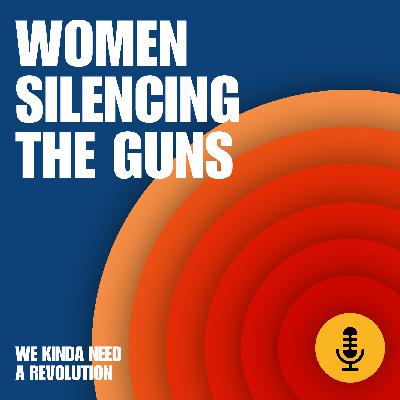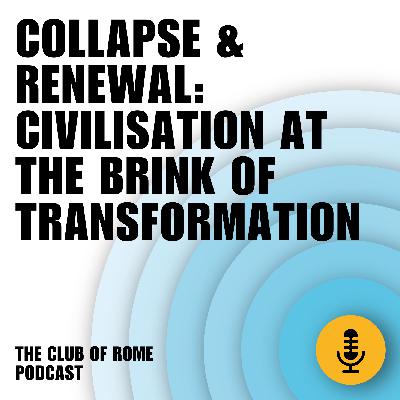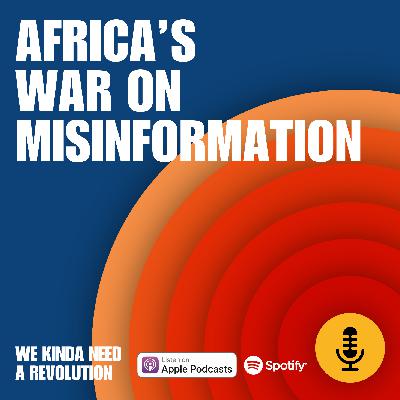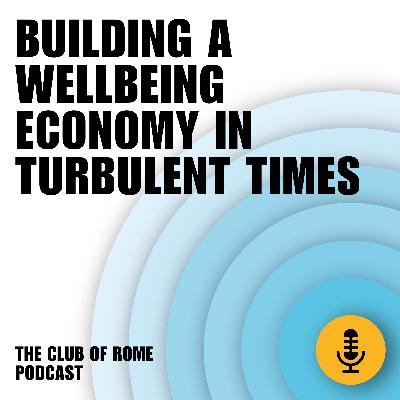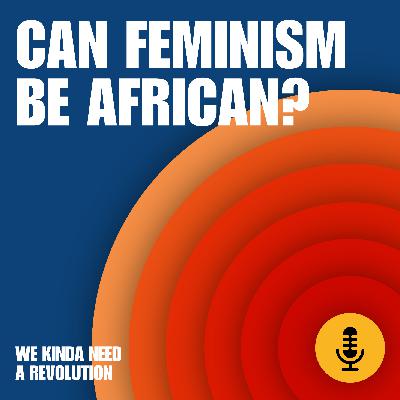Women silencing the guns with Aya Chebbi and Nolita Mvunelo
Description
Africa’s adult population consists of three generations: the independence generation that lived through colonial rule and subsequent liberation, the multiparty system generation, and the younger generations with the complex challenge of ensuring peace, prosperity, and climate resilience within one generation.
In this episode, Nolita Mvunelo is joined by Aya Chebbi, Founder of the Nala Feminist Collective. Aya rose to prominence as a political blogger during Tunisia’s Revolution. She later became the first-ever African Union Special Envoy on Youth, championing youth inclusion and intergenerational collaboration through campaigns such as “silencing the guns”. Today, she leads NalaFem, one of Africa’s largest multigenerational alliances of women politicians and activists united towards transformative feminist change. Together, Aya and Nolita dive into the role of African women in strengthening peace and security while exploring the evolving perspectives on youth leadership in bringing reform.
Watch the episode:
Full Transcript:
Nolita:
We kinda need a revolution. Welcome to a special edition of The Club of Rome Podcast, exploring how we can work together across generations, across cultures, across regions, to mobilise action for a regenerative future, a podcast about how to drive meaningful change when the only response seems to be... we kind of need a revolution. I am Nolita Mvunelo, Programme Manager of The Club of Rome, and in this episode, I had a chance to speak to Aya Chebbi from Tunisia about women and silencing the guns. Aya was the first African Union youth envoy and founder of Nalafem Collective. Well, thank you for joining us today, Aya. Thank you for taking the time to speak to us. You were the first African Union youth envoy, and a sizable part of your work focused on the theme silencing the guns. Today, you lead Nalafem, one of Africa's largest multi-generational alliances of women and politicians and activists united towards transformative feminist change. Has there been a shift in thematic focus, from silencing the guns to, you know, transformative change from women, and if so, what inspired that shift?
Aya:
Thank you so much, Nolita. No, there hasn't been. I think for me, gender justice issues are intersectional issues. When I launched Nalafem, it was guided by Africa Young Women Beijing+ 25 Manifesto, which we convened at the African Union. Six consultations, six regions of Africa, and they came up with 10 demands, and part of those demands are silencing the guns, sexual reproductive health rights, economic justice, digital justice and so on. So Nalafem is taking that manifesto to member states to ensure the implementation and accountability of these demands to go to the ground and trickle down to women and girls in conflict settings, in rural areas, in displaced areas. So, it definitely hasn't shifted. I think it deepened, because now I'm focused on looking at peace and security from a feminist lens. I'm looking at peace and security from where are the young women at the table of negotiation. But I think also part of the problem in women, you know, peace and security, youth peace and security is looking at these issues in silos and not looking at them as intersectional issues that have to address health and education and employment and all the other issues that we talk about.
Nolita:
In your work of trying to get member states to adopt some of the work and the policies, what has been like, the most surprising thing that you did not expect to happen.
Aya:
Well, you know, after being in this space for over 15 years, I'm not surprised anymore. Member states, a lot of the member states’ attitudes towards looking at women and young women in leadership. For me, the double standard, the contradictions of how member states behave, remain my biggest surprise, even though some of the countries it's just not surprising anymore. Like they have a track record of that's how they deal with issues in silos. I think particularly for Africa, this is really globally, you know, at different levels, especially Africa-Europe dynamics, but particularly in Africa, I think after over decades advocating for youth participation, and especially young women, and still hearing the rhetoric of, you know, demographic dividend, but not seeing it on the ground, hearing the rhetoric of youth as a force of change, but not seeing young people appointed to leadership positions, hearing the rhetoric of, yeah, women at the table. But we look at Senegal, recent election, and we don't find any single women in the cabinet. We look at all the recent elections, and it's, you know, a lot of old men holding space, or even younger men now holding space in Chad, the recent election - a 40 year old. But then you look at society, you look at the leadership spectrum, you don't see women and youth. And so that's also contradiction is still surprising to me, because I think we passed the stage of saying why youth should be co-leading this space, why, you know, women and young women should be in these spaces. I think we all agree on why. So, why are we not moving to implementation?
Nolita:
That's such a good point. Because I remember when I first learned of you and your position at the AU, I was like, “Oh my gosh, this is such a big moment, right?” A young woman, a young woman in such a high-level position, but to your point is that, like, very rarely does it trickle down back into leadership at different spheres, and there's like, there seems to be a resistance. How can young people contribute to driving forth that cause that you were such an implementing moment of?
Aya:
You know, I'm quite frustrated because young people have done an incredible, incredible, incredible mobilisation. Have taken lot of risks since 2010, 2011 revolutions, from Tunisia to Libya to Senegal to Sudan to Algeria to Burkina Faso, you know. So, I think there is a lot of like always demand from youth, whether it's democracy or the climate movement or whatever cause is. The decision makers who are predominantly male and old, they always expect youth to call on or to champion or to, you know, drive the change, you know, but at the same time being really intimidated by these youth who are demanding change. So, you want youth to demand change, and then when they go on the streets, you're ready with tear gas and arrest and deportation or whatever it is. So, you know, I think there is predominantly a fundamental question of how the African state relates with its youthful population, that needs to be addressed. Because now that we're having, let's say, more young people in the system, whether it's head of state, we had two at least this year elected in their 40s or members of parliament, we don't see the system changing. So, it's not just now a generational issue. It's also a system-based issue. And these institutional systems, they're post-colonial systems that were built on a certain legacy and that they do not speak to the youth population aspirations, the way they're structured. They do not speak to the citizenship, which is predominantly young, the youngest in the world. And I think that's where we should really put our efforts, and our analysis and to address the root cause of this. We're pretty much focused on what's going on, very politically, on the political level, but we're not looking at systems change. Because if you, even if you put massively right now young people in the system. If the system is failing, it's not going to work. You're going to set up this generation to failure as well. And I think we need that incremental change in reforming the system and making it respond to the aspiration of this century and the next century for it to make sense. From Nalafem side, what we're trying to do is to really prepare this generation when they take on the system, because we know this is an army of women we're building to take charge of the continent, but we don't want them to perpetuate the same practices, the same norms, the same system, the same policies. We want to make sure that, first of all, they all know each other, they all understand where they come from and their stories and their context. So, when they're all at the same level of leadership, change can be accelerated. If you look at the whole of the African Union and you find more than 50% of these leaders actually understand where we're all going, actually, not disputing these small you know, self-interest debates and know where we should be going. Those policies will pass like, you know, very fast. And I think that's when you need that army to take charge with the same values, the same understanding of the future, the same aspirations at the same time. And that way you see a shift, I think that's one thing we're trying to do. And then the second thing is to make sure there is a generational healing. So part of what we do is a lot of work on multi-generational. It's not like, you guys are irrelevant, and we should, you know, take over you. It's more like, how can we co-lead this moment? Because we're going to take over anyway, and so without when we transition, we can build something better, and we can be better leaders than you were.
Nolita:
Two questions, then. One is, you mentioned an aspiration of the century, or the aspiration of the generation. If you were to articulate in a few sentences, what would it be? And then the second one, maybe adding on to that is, part of it has to do with power, right? Because we look at it from a generational lens. But to your point, about like, systems are not changing, like we're asking for inclusion, but we're asking for inclusion in systems that fundamentally do not work for the type of makeup that we have. There's a point in there at the centre about it has to do with power and how we organise power, in that at the end of the day, the

